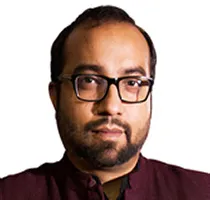It is always a good feeling when you spot talent early. That’s how some of us in India feel now that Zhao Lijian, the spokesperson of China’s foreign ministry, has become a global star. Zhao’s briefings have grown sharp, pugnacious and newsworthy as criticism of Beijing’s response to the virus has risen around the world. He single-handedly set off weeks of acrimonious debate by speculating on Twitter that it might have been the “U.S. army who brought the epidemic to Wuhan.”
We in India noticed Zhao a while ago, when he was a junior diplomat in Islamabad. He distinguished himself in that posting, honing skills that are becoming an indispensable part of the new-age diplomatic arsenal: misdirection, misinformation and social-media aggression. Zhao collected hundreds of thousands of Twitter followers along the way, as well as a promotion. Across the world, scores of “wolf warrior” Chinese diplomats — named after a blockbuster set of films about an elite Chinese commando unit — have followed Zhao’s example, setting up Twitter accounts that attack their hosts, clap back at negative stories in the press and sometimes promote fringe conspiracy theories.
It’s easy to think of this brash behavior as something characteristic to the Xi Jinping-era Chinese state, which seeks in every domain to reflect the new assertiveness underlying the Chinese president’s “four confidences” doctrine. But China’s young diplomats aren’t unique; the U.S. State Department has pointed out that “disinformation narratives” from Iran, Russia and China on the coronavirus have “converged.” And, as effective as Zhao is on Twitter, he has yet to approach the grandmaster-level trolling of the Russian Embassy in London.
Is there a point to this aggressiveness? Some older Chinese diplomats sound appalled by the wolf-warrior approach. But they aren’t the audience. Neither is global public opinion. For diplomats like Zhao, the real goal is to win the approbation of your superiors — and, importantly, a devoted following of hyper-nationalists at home.
For centuries, a key job of diplomats abroad was to moderate and translate the snarls of the xenophobic mobs back home. Today, a country’s emissaries are rewarded if they amplify nationalist growling. Those who hew to the hardest line become heroes and those who do their traditional job are condemned. Zhao, when he returned to Beijing after his Islamabad posting, was cheered into his new office by a group of admirers.
The fact is that nobody really knows how to conduct old-style diplomacy in the age of social media, when the people you supposedly represent and those you are trying to placate can insult each other freely on Twitter 24 hours a day. India’s diplomats in the Gulf monarchies, for example, are in particular difficulties at the moment. Skewed reporting about the pandemic has set off a wave of Islamophobia in India, online and off, which has alienated some in the normally India-friendly Gulf elite. India’s diplomats in the region have been caught in the middle, desperately trying to assuage local anger while avoiding saying anything that might be inconvenient for their political masters back home.
And then there’s the U.S., which has a very specific and high-level problem, namely its president. Donald Trump’s ability to redirect, contradict or just confuse U.S. foreign policy aims through a single tweet is nothing short of awe-inspiring.
And it is worth remembering that the problem will not go away with Trump. Every diplomat in the world should be worried about a boss with access to a Twitter account. Even the inoffensive Canadians managed to start a Twitter war, remember? Foreign Minister Chrystia Freeland sent out a tweet asking Saudi Arabia to release a women’s-rights activist, and the Saudis cancelled flights, recalled their ambassador and started selling Canadian assets.
Many assumed that social media would strengthen diplomacy by giving leaders like Trump more power to directly negotiate and manage narratives — that “top-down” diplomacy would replace “dialogue-based models.” But, in diplomacy as elsewhere, radically democratizing a previously closed space hasn’t necessarily improved matters. Like politicians and journalists, diplomats are now encouraged to react to the angriest and loudest voices they hear. They feel accountable to them — and are, perhaps, a little scared of them.
Instead of being the adults who foster dialogue, who can see both points of view while arguing for one, diplomats are being transformed into megaphones for narratives that are already loud enough to be heard across continents. In the process they are in danger of rendering themselves redundant. The “wolf warriors” may well tell us something about today’s China. But what they tell us about the future of diplomacy is just as disturbing.
This commentary originally appeared in Bloomberg.
The views expressed above belong to the author(s). ORF research and analyses now available on Telegram! Click here to access our curated content — blogs, longforms and interviews.




 PREV
PREV


